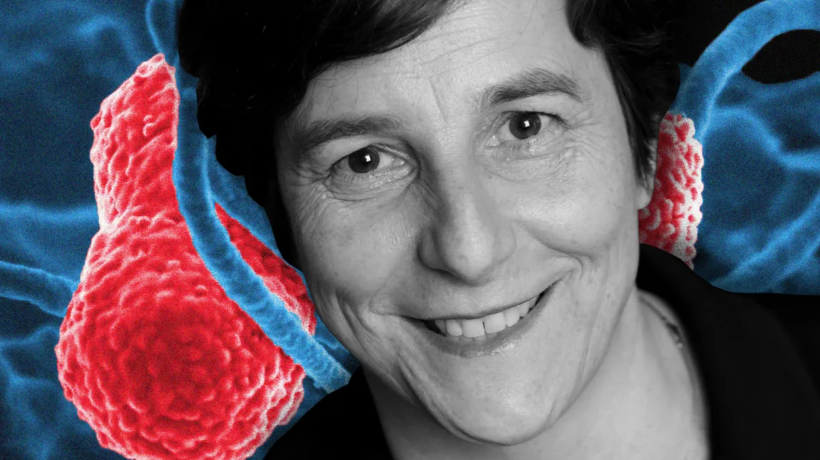Pfizer has made an incredible announcement: Its COVID-19 vaccine looks like it is 90% effective at preventing the disease inside its clinical trial. It’s a remarkable number: In the last 10 years, flu vaccine efficacy rates have wobbled between 19% and 60%. Outside scientists are now keen to see the full data in order to validate the findings. In the meantime, many are rejoicing at the prospect of a better tool for fighting COVID-19.
From the beginning, Merck chose challenging disease targets. When she joined Merck in 1992, she pushed the company to develop a vaccine for human papillomavirus or HPV, which can cause cervical cancer in women. It was an improbable project from the start. No one had been able to develop a vaccine for herpes, a similar sexually transmitted virus that can cause legions. However, according to a profile in Stat News, Jansen had come across research from the University of Queensland that suggested that when HPV proteins were bioengineered out of yeast, they assembled into virus-like particles—a potential foundation for a vaccine.
Jansen reportedly had a difficult time getting her colleagues on board with an HPV vaccine even after convincing the head of Merck’s research labs. There was concern that it would be a money suck for the company, something that no one wanted to be associated with. But Jansen persevered and Gardasil was approved in 2006. CDC director Robert Redfield considers the vaccine key to eliminating cervical cancer. In 2017, the CDC found that 66% of 13- to 17-year-old females received the first dose of the HPV vaccine while 49% completed the vaccine series.
Since then, Jansen has been responsible for leading the development of a vaccine that guards against 13 different strains of pneumococcus, which causes meningitis in children and pneumonia in older patients. She has continued to work on vaccines for various strains of pneumococcus and sought out new challenging territory for vaccine development. Then COVID-19 struck.
Under Jansen’s leadership, Pfizer decided to collaborate with German biotech company BioNTech on a vaccine for COVID-19 using mRNA, an unproven technology that uses ribonucleic acid to program the body’s immune system. It has great potential, but no mRNA vaccine has ever been approved for use. It seems like just the kind of daring project Jansen likes to get behind.
Gregory Poland, director of Mayo Clinic’s Vaccine Research Group, says he’s known Jansen for two decades. “I think of her as a capable scientist to lead something like this,” he says.
ENCOURAGING BUT PRELIMINARY RESULTS
In August, Pfizer and BioNTech revealed data from its phase I trial showing that its two vaccine candidates appeared to be effective both in young and older adults. The company ultimately chose to focus on one of these vaccines that had fewer side effects and encouraged a better immune response. That vaccine is the subject of Monday’s early phase II/III trial analysis.
Some experts are excited about the potential of Pfizer’s vaccine and believe it bodes well for other vaccines in the category, like the mRNA vaccine being developed by Moderna. “Multiple candidate vaccines had similar immunogenicity profiles in humans, and multiple candidate vaccines had efficacy in pre-clinical models, so there is not [a] specific reason not to expect multiple other candidate vaccines to do well in humans nows [sic],” Shane Crotty, a vaccine researcher at La Jolla Institute in California, tweeted this morning.
1/ This is a truly excellent and important outcome. Greater than 90% efficacy at preventing disease, with 94 COVID-19 cases to evaluate, is an excellent outcome! It would be good to see more of the data, but those are very convincing numbers. https://t.co/y0T2PVLmHC
— Shane Crotty (@profshanecrotty) November 9, 2020
In contrast, Poland has tempered enthusiasm for the announcement. “I abhor science by press release,” he says, while noting that releasing initial results via press release is likely not Jansen’s idea.
Poland says that while the news is encouraging, it’s very preliminary. “We only know about data in the seven days following a second dose [of the vaccine],” he points out, and what we don’t know is manifold. He says it’s not clear how durable the vaccine’s protection is, who it best protects, or whether it guards against severe disease rather than just mild or moderate disease. Other questions he has are whether this vaccine will work in an environment where no one is wearing masks, or if it will be effective as the virus mutates.
Poland expects that Pfizer’s 90% efficacy number will come down when the vaccine is released since study populations rarely reflect real world populations. Normally, vaccines take many years to develop. “The chicken pox vaccine took 20 years,” Poland says. That time is what enables scientists to answer some of the questions he raises.
Jansen has been explicit about wanting the vaccine science to speak for itself. Pfizer has not taken any funding from the federal government for research and development of its vaccine. However, Operation Warp Speed has promised to pay $1.95 billion for 100 million doses of Pfizer’s vaccine to be delivered by the end of the year.
Pfizer’s choice to focus on science over politics may enhance confidence in a vaccine. The number of adults who would likely get a vaccine has fallen from 72% in May to 51% in September, according to Pew Research. The same survey found that many Americans were concerned that a vaccine would be made available before its safety and efficacy were known. Jansen and her colleagues at Pfizer and BioNTech have moved fast, but keeping the focus on scientific outcomes may pay off as the company seeks emergency use authorization for its vaccine from the Food and Drug Administration.







